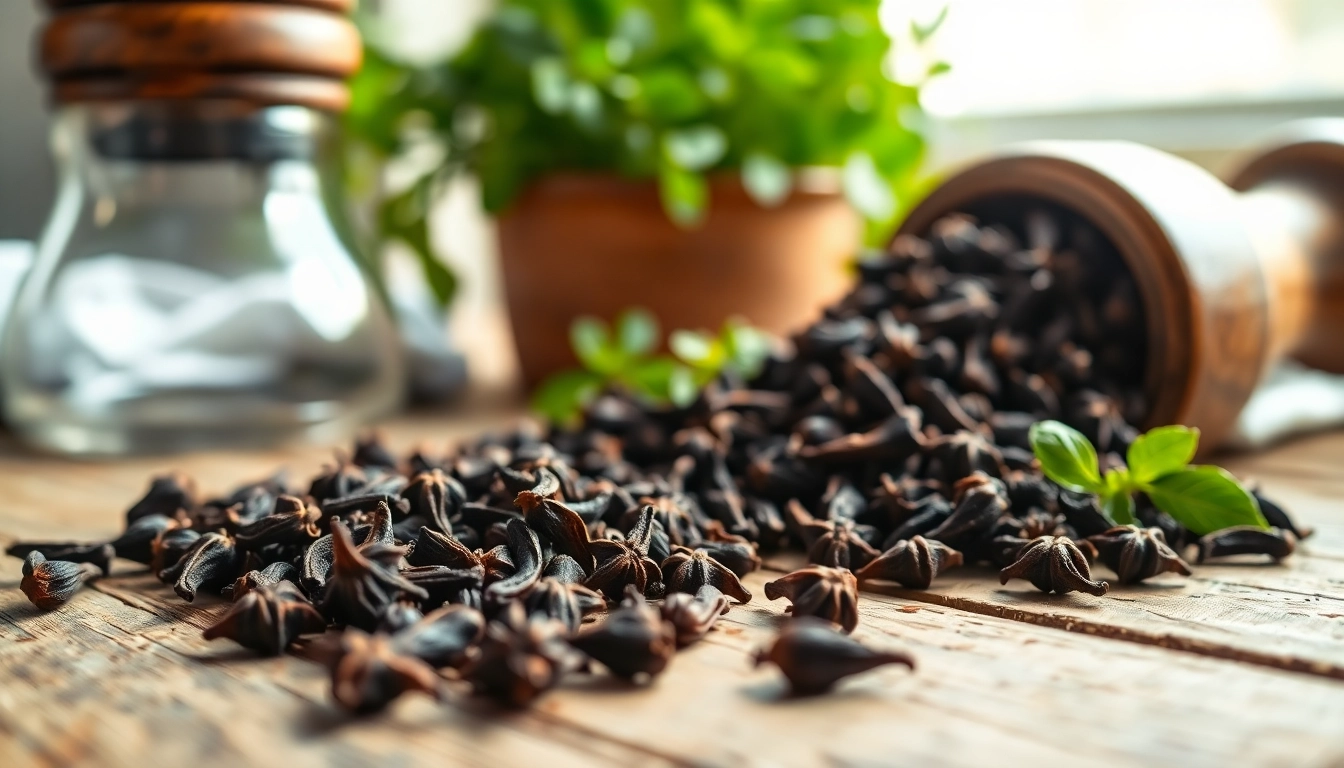Introduction to Cloves
Cloves are a remarkable spice that can elevate the flavor profile of many dishes while also offering a myriad of health benefits. These aromatic flower buds come from the Syzygium aromaticum tree, part of the Myrtaceae family, and are predominantly cultivated in tropical regions, particularly the Maluku Islands in Indonesia. Known for their strong, pungent flavor and aromatic properties, cloves have found their place not only in culinary traditions but also in traditional medicine and cosmetic applications. For those looking to explore this fantastic spice further, the whole cloves can be purchased from dedicated sellers specializing in high-quality spices, such as Cloves.
What Are Cloves?
Cloves are the dried flower buds of an evergreen tree and are characterized by their long, nail-like shape and reddish-brown color. Their distinct aroma is released when the buds are dried and ground into powder. Cloves contain eugenol, an essential oil component that contributes to their unique flavor and smell, often described as a warm, sweet, and slightly bitter spice. They are commonly used whole or ground in both sweet and savory dishes, making them versatile and popular in various cuisines worldwide.
The Historical Significance of Cloves
The history of cloves dates back thousands of years, with records indicating their use as early as 300 BC in ancient Chinese medicine. Cloves were highly prized in ancient trade routes and were often used as a currency. Their value was not only based on their flavor-enhancing abilities but also on their medicinal properties. Cloves were used to combat ailments such as digestive problems and respiratory issues. By the Middle Ages, they had become a staple in European kitchens, often used to season meats and to preserve foods due to their antimicrobial properties.
Different Types of Cloves
Several types of cloves can be found worldwide, with the most notable being:
- Indonesian Cloves: Known for their bold flavor, they are often used in spice blends and cooking.
- Ceylon Cloves: These cloves are native to Sri Lanka and renowned for their subtler flavor and high oil content.
- Tanzanian Cloves: Milder in flavor compared to Indonesian varieties, they are harvested mainly for essential oil production.
Understanding these differences helps in selecting the right variety for culinary or medicinal purposes.
Health Benefits of Cloves
Cloves are not just a flavor enhancer; they also boast a wealth of health benefits that make them a valuable addition to any diet. Here are some key health benefits associated with this spice:
Nutritional Profile of Cloves
Cloves are packed with nutrients, making them a potent addition to your diet. They are rich in vitamins and minerals, including:
- Vitamin C
- Vitamin K
- Calcium
- Manganese
- Magnesium
These nutrients help support various bodily functions, enhance immune health, and contribute to overall wellness.
Antioxidant Properties
One of the standout features of cloves is their high antioxidant content. Antioxidants play a crucial role in protecting the body from oxidative stress, which can lead to chronic diseases. Cloves contain several antioxidants, including eugenol, which has been shown to combat inflammation and support immune function. A diet rich in antioxidants is associated with a reduced risk of heart disease, cancer, and other health issues.
Cloves for Digestive Health
Cloves have long been recognized as a remedy for digestive disorders. They can help stimulate the production of digestive enzymes, assisting in more effective digestion. Cloves are also known to alleviate symptoms of bloating and gas. Drinking clove-infused tea or using cloves in cooking can provide relief from digestive discomfort and promote gut health.
How to Use Cloves in Cooking
Cloves can enhance a variety of dishes, whether you’re preparing savory meals or sweet treats. Understanding how to incorporate cloves effectively is key to maximizing their flavor.
Recipes Featuring Cloves
Here are some delicious recipes that highlight the unique flavor of cloves:
- Clove-Spiced Apple Pie: Adding a pinch of ground cloves to your apple filling can elevate the flavor profile and bring warmth to this classic dessert.
- Spiced Moroccan Tagine: Whole cloves can infuse slow-cooked dishes, providing aromatic depth and complexity.
- Clove-Infused Rice Pilaf: Adding whole cloves to rice while cooking can impart a subtle spiciness that complements many main dishes.
Pairing Cloves with Other Spices
Cloves work well when paired with other spices due to their strong flavor. They complement:
- Cinnamon
- Nutmeg
- Allspice
- Black pepper
These pairings can create aromatic spice blends that enhance both sweet and savory dishes.
Storing and Preparing Cloves
To preserve the freshness and flavor of cloves, proper storage is essential. Here are a few tips:
- Store whole cloves in an airtight container in a cool, dark place.
- Ground cloves lose their potency quicker, so it’s best to grind them as needed.
- For added flavor, toast whole cloves in a dry skillet before using them in recipes.
Cloves in Traditional Medicine
Cloves have been valued in traditional medicine for their numerous health-promoting properties.
Cloves for Pain Relief
The eugenol in cloves is known for its analgesic properties, making it effective for alleviating pain. Clove oil, when diluted, can be applied to sore gums to ease dental pain or used topically for headaches and muscle aches. It is often recommended to use clove oil in moderation due to its potency.
Clove Oil: Uses and Benefits
Clove oil is extracted from clove buds and is recognized for both medicinal and therapeutic applications. Some benefits include:
- Infection prevention due to its antimicrobial properties.
- Support for oral health through its effectiveness against bacteria causing gum disease.
- Using clove oil in aromatherapy can promote relaxation and relieve stress.
Precautions When Using Cloves
While cloves are generally safe for consumption, some precautions should be considered:
- Pregnant women should limit clove consumption due to potential effects on blood clotting.
- Individuals on anticoagulant medications should exercise caution.
- Clove oil should be used in moderation to avoid irritation or toxicity.
Exploring Cloves Beyond the Kitchen
Cloves offer more than just culinary applications; they are also widely used in beauty and wellness routines.
Cloves in Natural Beauty Products
The antibacterial properties of cloves make them beneficial in skincare. They can be found in various beauty products, including:
- Facial masks to promote clear skin.
- Exfoliators that help remove dead skin cells.
- Hand creams to prevent dryness and irritation.
Homemade recipes like clove-infused oils can also be used for skin benefits.
Clove Essential Oil in Aromatherapy
Utilizing clove essential oil in aromatherapy can elevate one’s mood and promote relaxation. It can be diffused into the air or diluted with a carrier oil for topical application. The fragrance of cloves can also help ward off stress and anxiety.
Innovative Uses of Cloves in Daily Life
Beyond cooking and beauty, cloves are innovatively used in various daily applications:
- A natural air freshener: Boil cloves with water and citrus peels to create a pleasant scent in your home.
- Repelling pests: Cloves can deter unwanted insects when placed strategically around the house.
- Homemade potpourri: Use dried cloves alongside other spices and dried fruits for a rich aroma.



